
» KEY POINTS
- Congress does not reflect the American people in the most fundamental and even superficial ways.
- Political alignment, gender/sexuality, race, religion, age, earnings, net worth, and education of Congresspeople do not even come close to the electorate.
- There is no amount of law, policy, redistricting, quota filling, or any other method that can change the current situation.

While the 2018 Congress was elected by around half of the eligible people in our country, the half that did vote was severely underrepresented just by the sheer number of returns received for each Party. But does it go beyond that? Well, let us start off at a basic question: How did representation align to political affiliation?
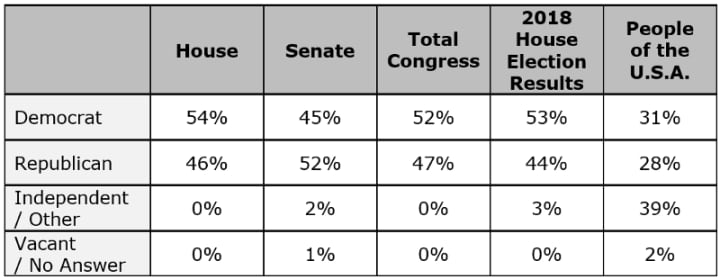
As can be seen above, even in the election where third parties like Libertarians, Greens, and others received 3% of the votes, they saw no seats in the House of Representatives. The Senate had two Independents that functioned as Democrats and caucused with them, so there was hardly a balance in that chamber. You may think 3% seems like not much, but that amounted to nearly 2 million people who voted.
What is much more telling on that front, though, is how people were affiliated. Looking at a 2018 Gallup Poll on political affiliation (which aligned closely to numbers seen in States that had Political Party registration), the largest Political Party was "none" or "all other Political Parties"! Think of it this way: if 39% of people were not Democrats or Republicans, then nearly 2/5th of people had absolutely zero representation in Congress.
Keep this in mind in for the next section while we now turn towards a closer look at the makeup of Congress. First, let us look at some rather surface elements of Gender Identity and Sexuality:

That Congress (especially the House of Representatives) had been celebrated as the most female and most representative of other gender identities and sexualities ever. In truth, it was exactly that. However, it was far away from being a true mix of American society. This was and remains a male heterosexual dominated institution that lacks a proper balance of viewpoints on something as basic as the makeup of births (LGBTQ+ numbers are estimated off of self-reported data). In this same vein, let us poke at race and ethnicity:
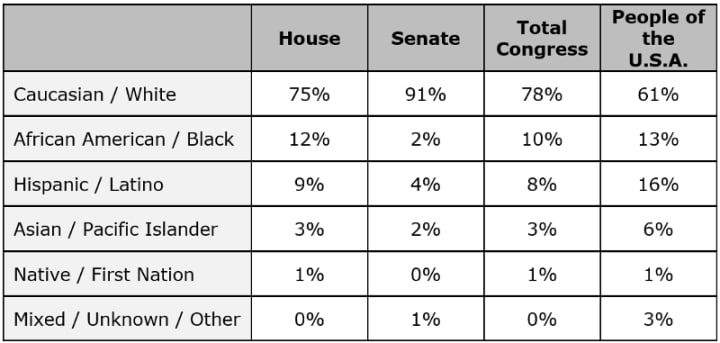
If you believe race and ethnicity have an impact on thoughtful representation, these numbers should be chilling. Every single group was underrepresented except for Caucasian / White which saw a +17% distribution towards that group at the expense of all others. That Congress was and still is mostly male, heterosexual, and white is not a surprise to most people, but when you look at how far it is off from the population it does look a lot like a suppression of all other groups. Mind you again, the Congress elected in 2018 was the most diverse ever at that time and it still did not even come close.
While the House of Representatives' makeup being created from smaller districts was closer to the actual population, the Senate did not nearly align due to each State having just two seats and the voting being done in a way that limits representation. Note: this is not claiming malicious intent (though many court cases have found malicious intent), but just a symptom of how Congress and voting is set up.
Now, let us go below the skin and look at religious affiliation. Though the First Amendment of the United States prohibits the establishment or suppression of any religion, religion is a powerful force in the country that informs many people's belief structures in how a nation should be run.
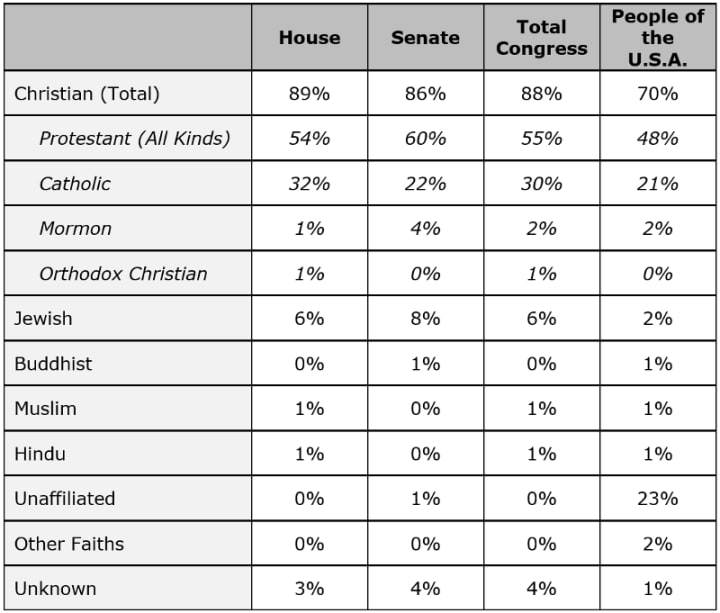
A dispute could be made about Christian groups having far outstripped influence over other religions, but there was one much more important number to take away:

The United States is not supposed to be a country where religion sets the agenda, but frankly it does. One quarter of people do not associate with an organized religion, and arguments could be made that many more that do so are not religious believers. Congress, on the other hand, is completely the opposite with a massively over-dominating presence of the religious believers. While many religions can claim persecution in this country, there is definitive decision-making being done against the non-religious the most. This group of people are discriminated against simply by not having a voice to counter the religious aspects of Congress.
Again, this is not an attack on religion; this is an attack on the lack of fair representation. When we talk about basic fairness, how can your view be heard and your concerns taken seriously when you have no say in how the country is run? Do not believe that this ends here as we move on to the age of Congress:
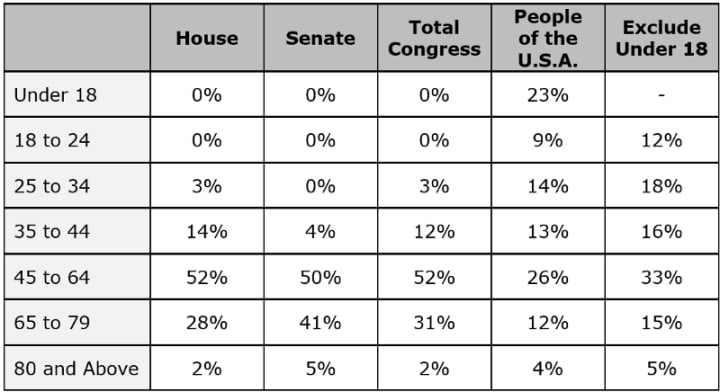
We should get a few things out of the way. First, by the Constitution, Representatives must be at least 25 years old and Senators must be 30 years old. However, no member of either chamber came close to those minimum ages. Instead, most people were far older with the 45 to 64 and 65 to 79 age groups representing 83% of Congress while only 38% of all people (and 48% excluding under 18 years old). Why is age so important, though?
Well, you will notice that the groups above are not broken up into even ranges. Instead, they represent phases of life, whether it be a child or young adult versus a middle career professional or a retiree. This is not an exact science and everyone's path in life is different, but this gives a general overview of where people stand. Now, we are not going to have children in Congress, so we can exclude them and still see the massive disparity between Congress and the people. The reason why I talk about "phases of life" is that people have different concerns as they age, what is most important to them, and what they need from the government. Younger people may care more about education, work opportunities, and access. Older people may care more about social welfare programs, security, and international relations.
Either way, if a group does not have representation then its concerns can be ignored. This may not be a willful ignoring, but more of an ignorance of what is important to a person at a different time in their life. How does a 75-year-old in Congress relate to the needs of a 19 or 25-year-old? How can younger candidates become known and get the resources to even run for Congress when they are eligible?
Also, if you think one Party skews far older than another, you are correct. Democrats had far more elder members including 6 older than 80 compared to 2 for Republicans. Oh, you thought the conservative Party was going to skew older than the liberal one? This shows why you cannot make assumptions on how people want to be represented. But this also shows the challenges that different age groups face while trying to get into Congress. The Senate skews even older than the House because it is difficult to break in to limited seats, which means that those who do get elected have often already served in many other parts of government and have made a career out of it. Thus, not only are they not representing the ages and concerns of those age groups, but they are not involved in the everyday experiences of those age groups.
This lack of the average person's experience extends to pay. There is no need for a chart here as members of Congress made a minimum of $174,000 per year -- where leadership positions paid more. Members of Congress are limited in how much direct pay they can make in outside jobs, but there are no limits on what their spouses can make, what can be made in non-monetary (re: stocks, real estate, intangibles, etcetera) compensation, and what can be done in a trust in their name for future payments. Just for comparison, 42% of households made under $50,000 a year and 30% made between $50,000 to $100,000. It is fair to say that member of Congress made significantly more than at least 80–85% of Americans. However, annual income is only the beginning.
What is a better and more accurate measurement is household wealth. This is a measure of all assets (think cash, real estate, stocks, etcetera) minus any debts. This way, it is not just about what an individual is making in a single year, but where they stand over their lifetime.
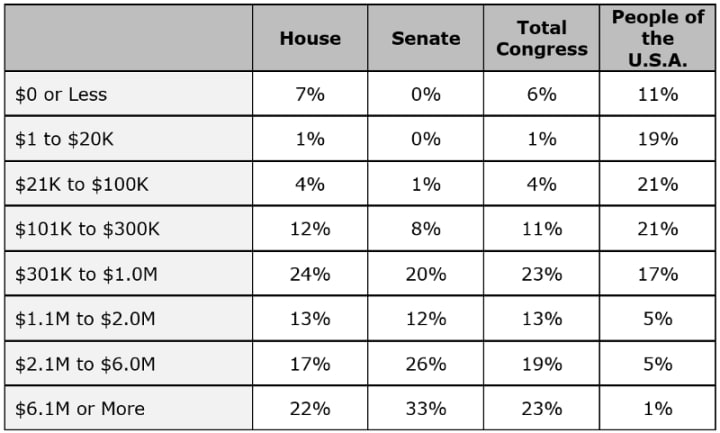
Congress was full of very, very wealthy people. While over half of Americans has less than $100,000 in net worth, over half of Congress has over $1 million in net worth. And due to these starting points, with smart investments those with high net worth continue to grow exponentially faster than those without. Now, again, this is not an attack on wealth. Nor is this an attack on any Political Party because the figures are very similar between Democrats and Republicans. Simply, as most Congresspeople make a large income and have incredibly high re-election rates (recall that it is 80–95% likely), even if they start off with a low net worth that completely changes the longer they serve.
Yes, many of these Congresspeople have worked incredibly hard outside of government to make their wealth. One could say a significant number of them have made a sacrifice to give up a lucrative career in order to take a lower paying job with severe limitations and almost no mobility. However, this is not an attack on wealth, but an attack on lack of representation. How can these people possibly understand the plights and needs of the average person when they are not in those groups? One can sympathize, one may even remember once being in that group, but experience will temper an opinion and urgency. The people in charge of all tax policy and spending cannot relate and effectively represent the people who are most impacted by those laws.
And it is not just straight wealth that is an indicator, but one of the precursors to wealth: education. Congress is by far more highly educated than the American people. While there is a direct correlation from higher education to higher earnings in the current American socio-economic climate, this only further exacerbates the situation of lack of prudent representation.
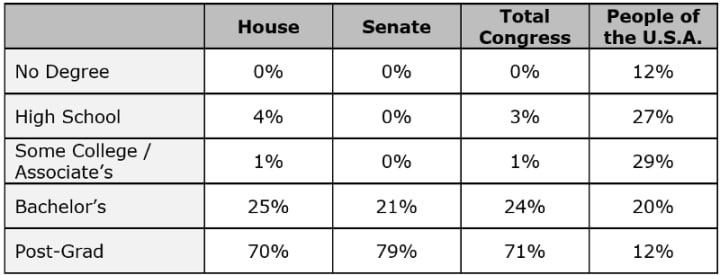
Being well educated is nothing that should be attacked and these Congresspeople should be lauded for their accomplishments. Some would even argue that we should want Congress to be more highly educated than the populace in order to understand and make law. Though there may be some weight to that argument, it is again a question of understanding constituents. If 68% of Americans had an Associate's degree or less and 71% of Congress had a Master's degree or more, how could their perspectives and needs be in line? They had totally different experiences and expectations in life!
Congress is not the will of the people because it does not successfully represent the people. These are but a few ways of slicing the American populous up to show how Congress does not align. This could go much deeper into specific policy beliefs, desires for the direction of the country, and other socio/economic/physical differences, but that is unnecessary. The point is just to show that no matter which way you slice it, Congress is not in line with those they are supposed to stand for. If the will, setup, and diversity of the people is not reflected in the government, then how can the government give back to the people what is needed?
To be clear, much of this is not Congress's fault. Members of Congress should not feel shame or be diminished because they happen to be part of group that is severely over-represented. Being more educated, making a fair wage, following your beliefs, expressing your culture and ethnicity -- these are all things that should be followed by those who desire it. In a way, Congress is as much of a victim as the citizenry because if there are no representatives to express other views, how can these groups possibly respond? If it is not part of their life experience and there is no one in Congress to express this, how would they know?
No, there is a systematic issue here. There is no amount of law, policy, redistricting, quota filling, or any other method that can change the current situation. All of those methods can make slight tweaks but will still leave at least half of America without someone to speak on their behalf. The Legislature of the United States of America is broken at its core because of the compromises that were made to get 13 former colonies to agree to join and stay in a single a federalist union. We have had over 230 years to see the consequences and above shows them in plain numbers.
In order to fix these base concerns, we need to rewrite most of Article 1 of the Constitution through a set of Amendments.

The above piece is a mildly modified excerpt from New & Improved: The United States of America by J.P. Prag, available at booksellers worldwide.

Learn more about author J.P. Prag at www.jpprag.com.

An earlier version of this article appeared on Medium.
About the Creator
J.P. Prag
J.P. Prag is the author of "Compendium of Humanity's End", "254 Days to Impeachment", "Always Divided, Never United", "New & Improved: The United States of America", and "In Defense Of...", and more! Learn more at www.jpprag.com.






Comments
There are no comments for this story
Be the first to respond and start the conversation.